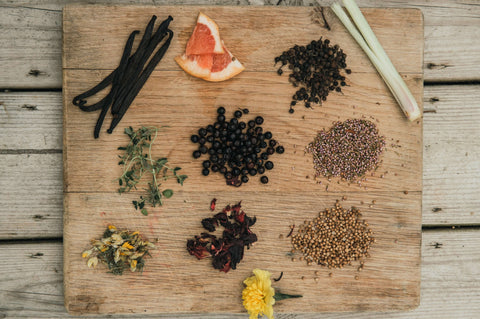Gin has been a popular drink for centuries, but in recent years it has made a stunning comeback on the luxury scene. London Dry Gin is known for its sophisticated blend of botanicals and its smooth taste. Let’s explore why this gin stands out from the rest and what makes it so special.
What makes London Dry Gin unique?
London Dry Gin is a style of gin that is produced in accordance with certain specifications set by the British government. These specifications dictate that it must be made with juniper as its predominant flavour and cannot contain any added sugar. The flavour of the juniper should be balanced with other botanicals such as coriander seed, citrus peel, and orris root.

What is the one-shot method?
The one-shot method is a distilling process that allows drinkers to get the most out of their favourite spirits. Unlike traditional methods, it doesn't require multiple runs or multiple batches of distillation. Instead, it's designed to capture all the flavours and aromas from just one single shot of spirit. This means that each bottle can offer a unique flavour profile with notes and nuances that are hard to achieve through other methods of distillation.
The benefits of the one-shot method
The one-shot method offers numerous advantages when compared to traditional methods of distillation. For starters, it yields higher alcohol content in comparison to other processes, meaning our customers get a fantastic value when they purchase a bottle of London Dry Gin distilled using this method. Additionally, this process also ensures that every drop is made with only natural ingredients and no added preservatives or chemicals—ensuring a high-quality product with unmatched flavour. Finally, this method produces fewer by-products than standard processes which results in less waste overall making it an eco-friendly option as well.
Copper Still: The secret ingredient in London Dry Gin

If you’ve ever wanted to know the secret behind a good London dry gin, then look no further than the copper still. Copper is essential to making a delicious and high-quality gin, as it helps to ensure that the flavours are balanced and smooth. Let’s explore why copper stills are so important when it comes to creating the perfect gin.
The role of copper
Copper has played a huge role throughout the history of distilling. It was first used by alchemists in the Middle Ages to purify and concentrate alcohol, and its importance has only grown since then. Copper stills are now essential components in any distillery, as they help to extract volatile compounds from botanicals while also removing impurities like sulphur and iron. This not only improves the taste of the resulting spirit but also allows for more intricate flavours to develop.
The benefits of copper distilling
In addition to extracting flavour compounds from botanicals, copper has some additional benefits when it comes to making spirits like London dry gin. Firstly, because copper is a great heat conductor, it can help even out temperature variations during distillation which leads to more consistent results. Secondly, as previously mentioned, copper helps remove impurities from alcohol which means fewer unpleasant aromas or tastes in your end product. Finally, it can also help make your spirit smoother by reducing harshness and adding sweetness on the palate.
Copper provides a few aesthetic benefits as well. When heated by a flame or electric element, its surface can take on a beautiful sheen. This adds a touch of elegance and sophistication to any distillery setting – perfect for those who want to enjoy their gin in style.
Check out the Exeter Gin School Experience
The appearance of London Dry Gin
Gin starts out as a clear liquid that is produced from various botanicals such as juniper berries, coriander seeds, angelica root and other herbs. The colourless liquid is then distilled in copper stills to create the spirit known as gin. However, what really makes gin stand out is its appearance - or rather lack thereof.
What does gin clear mean?
The term “gin clear” refers to the clarity of the spirit which gives it a clean and polished look. This is due to its high ABV (alcohol by volume) content which produces a drink that is not only smooth but also virtually colourless when poured into a glass. The transparency of London Dry Gin can be attributed to its distillation process which involves boiling off impurities that would otherwise cause its hue to change. As a result of this process, London Dry Gin will often appear crystal-like in its clarity – something that has attracted many admirers over the years.
Flavours of London Dry Gin
London dry gins typically have a strong aroma of juniper berries which is balanced out by notes of citrus fruits and herbs such as coriander, angelica root, and orange peel. The taste is often described as zesty and complex with a subtle sweetness that lingers on your palate.

What does juniper taste like?
London Dry Gin is particularly well known for its juniper-forward flavour, making it one of the most sought-after gins among aficionados and connoisseurs alike. But what does juniper taste like? Let’s explore the flavours and aromas that make London Dry Gin so beloved.
Bright, fresh, herbal
Juniper berries are what give London Dry Gin its distinctive flavour, adding a bright, fresh note to the gin that other spirits lack. The berries impart an herbal, woodsy flavour to the gin, with notes of pine needles and citrus. This creates a complex but balanced taste that leaves a pleasant lingering sensation on your palate.
Juniper adds depth
Juniper is also known for its fruity undertones, which can range from tart green apples to sweet oranges or lemons. These subtleties add depth and character to the gin and make it more enjoyable to sip on its own. In addition to these fruit notes, some gins also have subtle hints of spices such as coriander or cardamom, giving them an even more unique flavour profile.

"Bold aromas, excellent aromatic depth, stacks of fragrance and a big hit of juniper all deliver compelling complexity and I could not wait to dive in. Sipping this feels like a massive luxurious treat. Glossy and richly textured with juniper banging a deep bass drum, this glorious gin reverberates with refreshing citrus layers and a kick of zesty spice. It’s epic – a proper festival of flavours. And with tonic, I could drink it by the bucket!"
- Olly Smith, Great British Food Awards Judge
Choose your London Dry Gin at the Exeter Gin Shop
Botanicals and herbs
The signature flavours of London Dry Gin come from the botanicals that are used in its production. Juniper berries are often accompanied by other herbs such as coriander, cardamom, orris root, angelica root, nutmeg, orange peel, cinnamon bark, and more. The mix of these botanicals creates a unique flavour profile for each gin brand and helps create the distinct taste that separates one gin from another.
How does coriander work in gin?
Coriander plays an important role in most gins but especially London Dry Gins as it adds an unmistakable flavour note to the mix. The essential oils of coriander add earthy notes along with hints of citrus and spice which helps balance out the intense juniper flavours present in the drink. Coriander also helps give gin its characteristic sweet aroma which makes it so recognizable on the nose before you even take your first sip.
What is orris root?
Orris root is one of the most important botanicals used in making London dry gin. This fragrant flower root gives gin its signature floral notes, which balance out the juniper’s piney flavour profile. It grows best in soil with plenty of sun and good drainage, so it can be difficult to cultivate unless you have access to ideal growing conditions. For this reason, many distillers source their Orris root from dedicated suppliers who specialize in cultivating this delicate botanical.
What is angelica root?
One of the key ingredients in London Dry Gin is Angelica Root. Angelica Root is a flowering plant that has an earthy, sweet aroma. It can be found in the wild in northern Europe and North America, but it is most commonly cultivated in Germany and France. The root of this plant can be used to create essential oils that contain compounds like limonene, cineol, and linalool which are responsible for its unique aroma and flavour profile. This ingredient plays a critical role in London Dry Gin because it gives it a slightly sweet taste and an herbal complexity that sets it apart from other gins.
Citrus and floral notes
London Dry Gins can also have subtle citrus notes or even floral notes depending on what type of juniper berry is used in production. Citrus notes can come from lemon or lime peel while floral notes can come from rose petals or lavender. These subtle notes add complexity to the flavour profile and help distinguish one gin from another.
How does orange peel factor in?
Orange peel adds a lively flavour to London dry gin that enhances its taste profile and adds complexity to each sip. Its citrusy aroma provides an additional layer of scent that further enhances the overall experience when sipping on this style of gin—the perfect touch for luxury drinking occasions. Additionally, orange peel pairs well with spices like cinnamon and nutmeg that are often added to cocktails featuring London dry gin as a base liquor.
What does lemon peel add?
Lemon peel adds an extra layer of brightness and acidity to any drink made with London dry gin. It’s also a straightforward way to add a subtle sweetness without relying on added sugars or syrups. When used correctly, lemon peel can balance out the strong juniper notes found in many London dry gins while still allowing the other botanicals to shine through. Additionally, the zestiness provided by lemon peel pairs perfectly with tonic waters or other mixers that are often used with this style of gin.
Flavours of rose, lavender & hibiscus
Rose, lavender and hibiscus are commonly used to flavour gin, adding a delicate sweetness that complements the botanical notes of the juniper berries and citrus peel. Rose petals give London Dry Gins a subtle floral aroma while lavender brings out fruity notes that pair well with both sweet and savoury drinks. Hibiscus flowers are known for their bright red coloration and tart flavour; they add complexity to the gin without overpowering its more subtle elements. These flavours create a luxurious experience that is perfect for those looking to enjoy something special during an evening cocktail hour or celebration.
Herbal spices
London Dry Gins can also contain herbal spices such as liquorice root or ginger root which give them an even more complex flavour profile. These spices add a spicy kick to the overall flavour and make it stand out among other gins. They also help to balance out some of the sweeter flavours found in certain gins and provide an interesting contrast between sweet and savoury flavours.

Other botanicals like cinnamon bark or cassia can be added for additional flavour complexity. These botanicals are often steeped in water before being added during distillation so their flavours can be extracted properly during production. All these different herbs and botanicals come together to form an amazing array of flavours that make up London Dry Gin.
How to appreciate the aromas of London Dry Gin
To truly appreciate the aromas of London dry gin, it is important to understand how different botanicals affect the overall flavour profile. For example, juniper berries provide an earthy note while citrus notes lend brightness; angelica root adds sweetness; orris root provides a floral aroma; cardamom adds warm spice; coriander lends herbal notes; and lavender adds subtle undertones.
All these components combine to create a unique aroma that can vary greatly depending on the type of botanicals used in production. To get the most out of your tasting experience, take time to smell each component individually before taking a sip. This will help you better recognize each individual flavour note as you savour your drink.
The pristine sensation of London Dry Gin
When it comes to luxury spirits, few can compare to the mouthfeel of London Dry Gin. Its combination of botanicals creates a creamy texture that coats your tongue in deliciousness while still providing enough structure to give you something substantial to enjoy.
What is mouthfeel?
Mouthfeel is an important part of any spirit experience. It describes the way the liquid feels when you put it in your mouth, and how it changes as you swallow it or let it linger on your tongue. This includes the texture, viscosity, weight, warmth, temperature, lubrication and more. When you sample a new spirit like London dry gin, you can often get a feel for its complexity by paying attention to these physical characteristics.
The mouthfeel of London Dry Gin
London dry gin has a distinct mouthfeel that many people love because of its smoothness yet bold flavour profile. There are notes of juniper berry up front with subtle hints of citrus that complement each other perfectly without being too overpowering or cloying sweet. As you drink your gin, the flavours will coat your tongue before slowly dissipating into a rich but light finish that leaves your palate feeling refreshed and invigorated. Because each batch is distilled using traditional methods and aged in oak barrels for several months, the resulting product has an unparalleled depth and complexity that can only be achieved through years of experience and expertise.
Nuances of London Dry Gin
London dry gin should be enjoyed neat to truly appreciate all the nuances in flavour and mouthfeel that make this spirit so special. For those who prefer their drinks on the rocks or with tonic water, we recommend keeping things simple by adding only one or two ingredients to enhance – not overwhelm – this exquisite beverage. For added luxury, try garnishing with fresh herbs like rosemary or thyme to bring out even more complexity in the flavour profile.
Quality Matters
When it comes to London dry gin, quality matters more than ever before. Poorly made gins will often taste overly harsh or overly sweet due to inferior ingredients or poor distillation practices. On the other hand, well-crafted gins tend to have more subtle flavours and a much smoother mouthfeel overall which make them ideal for sipping neat or on the rocks.
Why Gin and Tonic make such a perfect pair
Gin and tonic is a classic combination that has been enjoyed by people all over the world for centuries. The two ingredients may seem like an unlikely pairing, but they come together to create a delicious drink that can be enjoyed anytime. But why does gin go with tonic? Let’s explore the history of this classic cocktail and discover what makes it so great.

The History of Gin and Tonic
Gin has been around for centuries, with its earliest recorded production being in the 16th century in Holland. It wasn't until later on in the 18th century when it gained popularity throughout Europe, particularly because of its use as a medicinal drink. At the same time, tonic water was being used as a treatment for malaria in British colonies in India. To make the medicine more palatable, gin was added to it to give it a more pleasant flavour.
Taste profile
The combination of gin and tonic creates a unique taste profile that is unlike any other drink out there. The crispness of the tonic water helps to offset some of the heavier flavours found in many gins while also providing just enough sweetness to make it enjoyable without being overly sweet or cloying. Additionally, many gins contain botanicals such as juniper berries which add an earthy component to balance out the lightness of the tonic water. Together, these flavours combine perfectly to create a refreshing yet sophisticated drink perfect for any occasion.
The science behind it all
The combination of gin and tonic goes beyond just taste; there is some science behind why these two ingredients go so well together. The botanicals in gin such as juniper berries, coriander seeds, cardamom pods, orange peel, and angelica and orris root, all contribute to its unique flavour profile.
When combined with carbonated tonic water, these botanicals release their essential oils into the air creating an aroma that enhances your experience even before taking your first sip! Additionally, the bitter taste of quinine found in tonic water helps to cut through the sweet notes of the gin making for one balanced and refreshing cocktail.
A winning combination
What makes this combination even better is that each sip provides different flavours depending on how much you mix them together. If you prefer something sweeter then add more tonic water; if you prefer something stronger then add more gin. No matter what mixture you choose though, you can be sure that it will always be delicious.
Mixology
Mixology is an art form that requires precision and skill to perfect each recipe. With gin and tonic, however, mixologists have even more freedom than usual when creating their drinks. There are countless types of gins available on the market today ranging from light floral notes to bolder spiced flavours so there’s something for everyone’s taste buds! Additionally, there are also plenty of flavoured tonics available as well which can help to add even more complexity and depth to your favourite gin and tonic recipes.

Enjoy a luxurious gin cocktail - perfect for summer
As the days get longer and the sun shines brighter, there is nothing more refreshing than a delicious London Dry Gin cocktail. Whether you’re looking for something sweet, something spicy, or something fruity, there’s a gin cocktail that will fit every taste. Here are three of our favourite summertime gin cocktails perfect for any occasion.
The Negroni
This Italian classic has become increasingly popular in recent years thanks to its unique flavour profile. To make your own negroni you will need 1 ounce each of London Dry gin, sweet vermouth, and Campari with an orange peel garnish. Simply combine all ingredients in a shaker filled with ice and stir until chilled (about 30 seconds). Strain into a rocks glass filled with fresh ice and garnish with a fresh orange peel.
French 75
This champagne-based cocktail is perfect for those hot summer days. You will need 1 ounce London dry gin, ½ ounce fresh lemon juice, ¼ ounce simple syrup and 3 ounces of dry Champagne or Prosecco to make it come together perfectly. Combine all ingredients except champagne/prosecco in a shaker filled with ice and shake vigorously until chilled (about 20 seconds). Strain into a martini glass then top off with champagne/prosecco before serving.
Gimlet
A Gimlet is a simple yet sophisticated choice that is sure to impress any guest. Just combine two parts dry gin with one part lime cordial in an ice-filled shaker cup then give it all a good shake before straining into chilled martini glasses. Garnish your Gimlets with thin slices of cucumber or lime wedges for an added touch of aromatics.
Tom Collins
The Tom Collins is a truly luxurious drink that will have everyone talking about your mixology skills. Start by combining 45ml of dry gin with 15 ml each of lemon juice and sugar syrup along with 60 ml club soda in an ice-filled shaker and shake vigorously before straining into an ice-filled glass tumbler or highball glass. Garnish with either an orange wedge or maraschino cherry for a luxurious finishing garnish.
Exquisite and elegant
London Dry Gin has been around for centuries and has become an iconic symbol for luxury consumption among admirers who find themselves drawn to its unique flavour profile as well as its elegant aesthetic appeal. With its subtle aroma of juniper berries and smooth finish with hints of citrusy notes, there is no wonder why London dry gins have become so popular amongst luxury consumers looking for an exquisite tipple.
Interested to learn more?
Click to visit the Exeter gin shop and explore our range of London Dry Gins, distilled in Devon.



